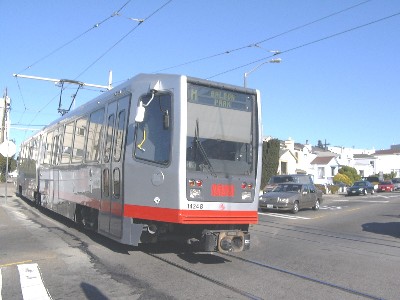
The Light Rail Now Project can be contacted at: Light Rail Now! |
Busting "BRT" Mythology "Bus Rapid Transit", Electric Rail, and Global Warming September 2006 With this commentary, Light Rail Now continues a new series we're calling Busting "BRT" Mythology – a discussion intended to examine claims of so-called "Bus Rapid Transit" by its proponents and to evaluate and contrast these claims with actual experience. This commentary is the second article in this series. Norman Rolfe is a professional engineer and transit advocate in the San Francisco area. website. A recent paper from Breakthrough Technologies institute (BTi – a Washington, DC-based nonprofit), published in the Journal for Public Transportation, 2006 BRT Special Edition, claims that "bus rapid transit" ("BRT") is "a better option to fight global warming than rail transit powered by electricity generated from fossil fuels...."
The thermal efficiency of conventional fossil fuel power plants is about 45%, and, of combined cycle plants, about 55%. One should figure 5-10% losses in transmission and conversion to direct current for the light rail system. The thermal efficiency of automotive diesels is about 20%. Since the BTi paper promotes CNG, i'll have to point out that CNG engines are spark ignition engines and will have lower thermal efficiency than diesels. So it should now be clear that the even if all the electricity were generated by fossil fuel plants the electrically driven system would use less fuel and hence produce less "greenhouse" gases per unit of useful energy than the internal combustion engine-driven system. Furthermore, there are many ways of generating electricity in addition to fossil fuel plants. Pacific Gas and Electric Co., the utility that supplies electricity to most of Northern and Central California, in its most recent bill insert on this subject, projects that in 2006 only 45% of its electricity will be generated by fossil fuel plants. The rest will be from hydro, renewables, and nuclear, which produce zero "greenhouse" gases. Another source tells me that the utility suppying electricity to Portland – which operates both the larger MAX LRT system and the Portland Streetcar system – gets 49% of its electricity from fossil fuel plants. The rest will be from hydro, renewables, and nuclear, which, again, produce zero "greenhouse" gases. All of the electricity used by the San Francisco Muni for its electric vehicles is hydro power from the City owned Hetch Hetchy system. Zero "greenhouse" gases – yet again.
i also note that the BTi researchers admit that present buses pollute more than light rail vehicles, but then assume some future buses will be much less polluting. Are those buses in existence yet? is this truly a realistic assumption? Again, it should now be clear that a system using electrically driven vehicles will produce less "greenhouse" gases than one using internal combustion engine driven vehicles. The BTi researchers' assumption that "BRT" will attract more riders than LRT is ridiculous and not borne out by experience. See, for example, Rail Transit vs. "Bus Rapid Transit": Comparative Success and Potential in Attracting Ridership. The old wheeze about BRT being less expensive than LRT almost always considers first cost only. i have tried in vain to get transit system planners, and others involved, to figure life-cycle costs, and to perform real long-term economic analyses. Generally, for heavy passenger volumes LRT will be more economical than "BRT" because of the longer life of the vehicles and the lower operating and maintenance costs. But many planners, politicians, media people, and others always come back to first cost. The familiar palliative is often heard: "We just don't have that kind of money." This seems to be a glib and convenient rationale for unwillingness to examine the potential of LRT more thoroughly. Breakthrough Technologies institute have, in my opinion, established a reputation for promoting "BRT" with dubious assertions and highly questionable evidence. They also seem inclined to advocate technologies that are currently impractical and probably will remain so. in this latest paper, BTi researchers seem to have remained consistent with that pattern.
Light Rail Now! website | |
|
|
||